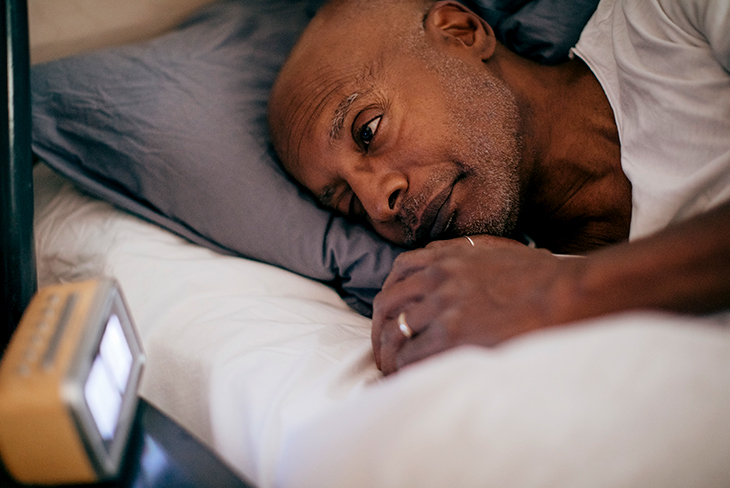4 ways to get better-quality sleep

It’s no surprise that how well you sleep has a direct impact on your physical and mental wellbeing. When you’re not getting enough sleep, you feel irritable and moody, but poor sleep or insomnia is also a common symptom of mental illnesses. Use these expert tips to help you stop counting sheep.
Picture the scene: after a long day of work, you can finally wind down and go to sleep. But despite being exhausted, sleep is elusive. You can’t fall asleep or bad dreams keep waking you up. Perhaps your brain has kicked into overdrive and you’re worrying about all the what-ifs, or maybe there’s light streaming in through the curtains from your neighbour’s garden. There are many reasons why you might suffer from insomnia or experience sleepless nights, but there is a direct link between sleep and mental health, so you must ensure you’re getting enough of it.
According to Harvard Health Publishing, chronic sleep problems affect 50% to 80% of mental healthcare users in a typical psychiatric practice. Sleep problems are particularly common in persons living with anxiety, depression, bipolar mood disorder and ADHD. It’s important to note the following:
- Insomnia and disrupted sleep are more likely to affect patients living with mental illness.
- Sleep problems can increase an individual’s risk of developing a particular mental illness.
- Treating the sleep disorder can help to reduce the side effects of the mental health condition.
Here are four ways to improve your sleep.
1. Put away your smartphone…
…and turn off your TV, tablet and computer at least 1 to 2 hours before bed. Why, you ask? Because the blue or bright light emitted by these devices tricks your brain into thinking it’s daytime, making it harder to fall asleep and sleep well. But that’s not all. ‘You’re meant to wind down before bed, but many television programmes are stimulating, so they have the opposite effect. Even social media can be emotional if you see something sad, exciting or frightening,’ explains sleep scientist Dr Dale Rae, the director of sleep science and a senior researcher at the University of Cape Town.
2. Have a banana in the morning
‘There is some evidence that food containing tryptophan eaten during the daytime can promote sleep at night,’ explains Dr Rae. Tryptophan is an amino acid that helps with the production of serotonin and melatonin – both of which can impact sleep positively, with the latter signalling to the body that it’s ‘sleep time’. Foods that contain tryptophan include bananas, berries and milk. ‘In the same way that certain foods can impact sleep positively, there are other things that can have the opposite effect: steer clear of high-sugar foods, caffeine and too much alcohol before bed,’ she adds.
3. Stop napping
If you’re struggling to sleep at night, you might want to nap during the day, but this isn’t a great idea, explains Dr Rae. ‘If you nap during the day, you’re going to find it harder to fall asleep at night. It would be more beneficial to push through until you’re exhausted, then you are more likely to sleep better at night,’ Dr Rae suggests. There are certain people who get a nap license, she says with a smile. ‘The following people are allowed to nap in the day: athletes, shift workers, people who are ill and new parents. If you’re not in one of those categories, and you’re otherwise healthy, steer clear of naps.’
4. Safely get some sun
To understand this, you need to understand melatonin. ‘Melatonin is a hormone that naturally occurs in the body. When it’s dark, your body produces this hormone, which signals to your body that it’s bedtime. During daylight hours, your body produces less melatonin, signaling that it’s time to wake up.’ However, now that we have technology to keep the lights on well past sundown, melatonin production is disrupted, resulting in disturbed sleep. ‘Getting your daily dose of sunlight in the morning is a great way to normalise your sleep-wake cycle, helping you sleep better at night.’ Try a coffee outside in the morning, going for a jog mid-morning or opening the blinds to allow the light to stream in while you’re working at the office.
Sleep-related apps that really work
- Headspace: This is a meditation app that will help you clear your mind so that you can easily fall asleep.
- SnoreLab: Record, measure and track your snoring so that you can discover effective ways to reduce it.
If a lack of sleep is disrupting your life and you are feeling overwhelmed, consult your general practitioner (GP) to see if a mental health professional could assist you. Life Mental Health is a leading provider of private acute mental health services at nine facilities in four provinces in South Africa.
The content provided is not intended to be a substitute for professional medical advice, diagnosis or treatment and does not cover every aspect of mental health. Consult a doctor or your nearest emergency unit if you are concerned about your own or a loved one’s mental health. The information is shared on condition that readers will make their own determination, including seeking advice from a qualified healthcare professional. E&OE. Life Healthcare Group Ltd does not accept any responsibility for any loss or damage suffered by the reader as a result of the information provided.

